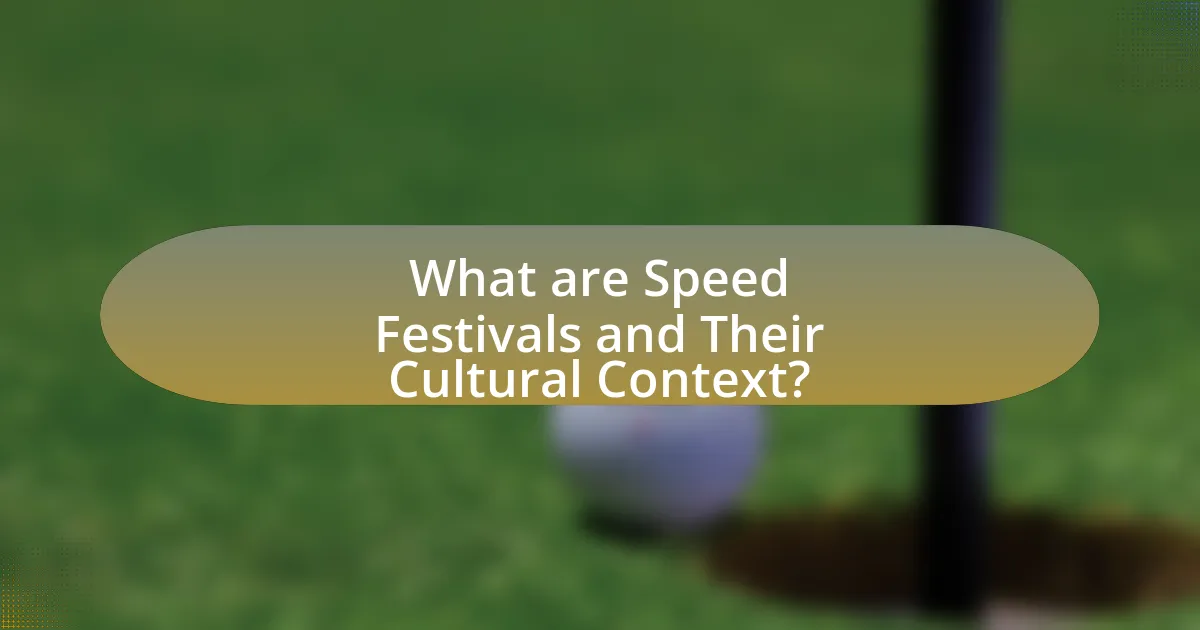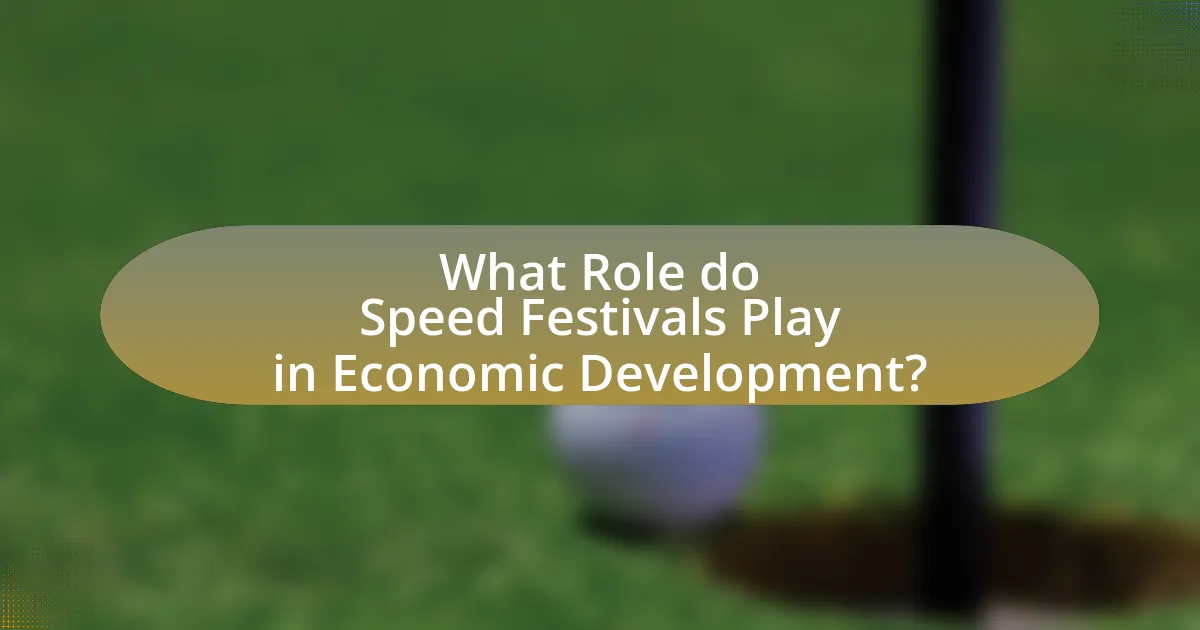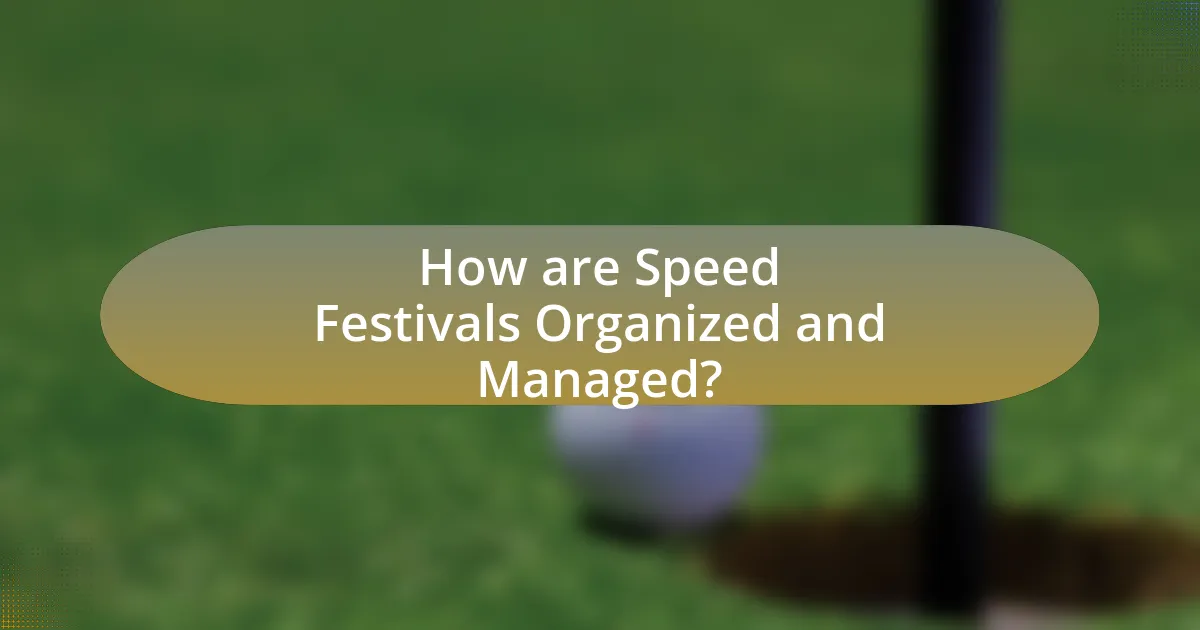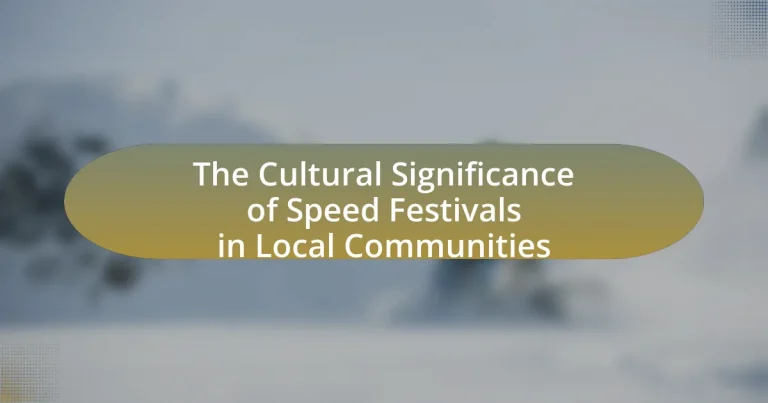Speed festivals are events that celebrate speed-related activities, such as racing and motorsports, while fostering community engagement and promoting local culture. These festivals reflect local traditions and values by showcasing regional customs, enhancing community identity, and supporting local businesses. The article explores the historical development of speed festivals, their economic impact on local communities, and the social benefits they provide, including youth engagement and empowerment. Additionally, it discusses the organization and management of these events, highlighting best practices for enhancing their cultural significance and addressing logistical challenges.

What are Speed Festivals and Their Cultural Context?
Speed festivals are events that celebrate speed-related activities, such as racing, motorsports, and other high-velocity competitions. These festivals often serve as a platform for showcasing local talent, fostering community engagement, and promoting regional culture. For instance, events like the Goodwood Festival of Speed in the UK highlight automotive history and innovation, attracting thousands of visitors and generating significant economic impact for local businesses. The cultural context of speed festivals reflects a community’s values, interests, and identity, often intertwining with local traditions and social dynamics, thereby reinforcing community bonds and pride.
How do Speed Festivals reflect local traditions and values?
Speed Festivals reflect local traditions and values by showcasing community identity and heritage through competitive racing events. These festivals often incorporate regional customs, such as traditional music, food, and attire, which serve to strengthen community bonds and celebrate local history. For instance, in many areas, Speed Festivals feature local drivers and vehicles that represent the region’s automotive culture, emphasizing pride in local craftsmanship and innovation. Additionally, these events often promote local businesses and artisans, reinforcing economic ties within the community. The integration of local folklore and storytelling during the festivals further highlights the cultural significance, making them a vital expression of community values and traditions.
What historical events have shaped the development of Speed Festivals?
The development of Speed Festivals has been shaped by several key historical events, including the rise of motorsport in the early 20th century, the establishment of organized racing events, and the cultural shifts surrounding automobile ownership. The introduction of the first automobile races, such as the Paris-Rouen race in 1894, marked the beginning of competitive speed events, which laid the groundwork for modern Speed Festivals. Additionally, the post-World War II economic boom led to increased car ownership and a growing interest in motorsports, further popularizing these festivals. The establishment of iconic events like the Indianapolis 500 in 1911 and the Monaco Grand Prix in 1929 also contributed to the cultural significance of Speed Festivals, as they became symbols of technological advancement and community pride. These historical milestones collectively influenced the evolution and popularity of Speed Festivals in local communities.
How do local communities participate in Speed Festivals?
Local communities participate in Speed Festivals by organizing events, providing volunteers, and engaging local businesses. These festivals often feature community-driven activities such as races, parades, and exhibitions that showcase local talent and culture. For instance, in many regions, local residents contribute by setting up food stalls, sponsoring events, and promoting the festival through social media, which enhances community involvement and economic benefits. This participation fosters a sense of pride and unity among residents, as evidenced by increased attendance and local business revenue during festival periods.
Why are Speed Festivals important to community identity?
Speed Festivals are important to community identity because they foster a sense of belonging and pride among residents. These events often celebrate local culture, history, and achievements, creating a shared experience that strengthens community bonds. For instance, Speed Festivals can showcase local talent, such as musicians and artists, while also promoting local businesses through vendor participation. This engagement not only enhances community cohesion but also contributes to the local economy, reinforcing the community’s unique identity and heritage.
In what ways do Speed Festivals foster community pride?
Speed Festivals foster community pride by bringing together local residents to celebrate shared interests in motorsports and automotive culture. These events create a sense of belonging and unity as participants and spectators engage in activities that highlight local talent, businesses, and heritage. For instance, Speed Festivals often feature local drivers, mechanics, and vendors, showcasing their skills and contributions to the community. Additionally, the festivals can boost local economies by attracting visitors, which further enhances community identity and pride.
How do Speed Festivals contribute to local cultural heritage?
Speed Festivals contribute to local cultural heritage by showcasing regional traditions, fostering community pride, and promoting local craftsmanship. These events often feature local music, food, and art, which reflect the unique cultural identity of the area. For instance, many Speed Festivals incorporate traditional racing techniques and vehicles that have historical significance, linking the present to the past. Additionally, they provide a platform for local artisans and businesses, enhancing economic sustainability while preserving cultural practices. This integration of local elements into the festival experience reinforces community bonds and ensures the continuation of cultural narratives.

What Role do Speed Festivals Play in Economic Development?
Speed festivals play a significant role in economic development by attracting tourism, generating revenue, and creating jobs. These events draw large crowds, which boosts local businesses such as hotels, restaurants, and retail shops. For instance, a study by the National Association of Sports Commissions found that sports events, including speed festivals, can generate millions in economic impact for host cities. Additionally, speed festivals often require local vendors and service providers, leading to job creation and increased economic activity in the community.
How do Speed Festivals impact local economies?
Speed Festivals positively impact local economies by driving tourism, increasing local business revenue, and creating job opportunities. These events attract thousands of visitors, which boosts spending in hotels, restaurants, and retail shops. For example, a study by the National Association of Sports Commissions found that sporting events, including speed festivals, can generate an economic impact of up to $1.5 million for host cities over a weekend. Additionally, local employment opportunities arise from event organization, staffing, and increased demand for services, further enhancing economic growth in the community.
What types of businesses benefit from Speed Festivals?
Businesses that benefit from Speed Festivals include local restaurants, hotels, retail shops, and automotive companies. These businesses experience increased foot traffic and sales during Speed Festivals, as attendees often seek dining options, accommodations, and merchandise related to the event. For instance, a study by the National Association of Festivals found that local economies can see a revenue boost of up to 30% during such events, highlighting the significant economic impact on these sectors.
How do Speed Festivals attract tourism to local areas?
Speed Festivals attract tourism to local areas by showcasing high-speed motorsport events that draw large crowds, boosting local economies. These festivals often feature a variety of activities, including races, exhibitions, and entertainment, which create a vibrant atmosphere that appeals to both motorsport enthusiasts and casual visitors. For example, events like the Goodwood Festival of Speed in the UK attract over 200,000 attendees annually, significantly benefiting local businesses through increased spending on accommodations, food, and merchandise. Additionally, the media coverage and promotional efforts surrounding these festivals enhance the visibility of the host location, further encouraging tourism.
What are the social benefits of Speed Festivals?
Speed Festivals provide significant social benefits by fostering community engagement and promoting local culture. These events bring together diverse groups of people, enhancing social cohesion and creating a sense of belonging among participants and spectators. For instance, Speed Festivals often feature local vendors, artists, and performers, which supports the local economy and showcases regional talent. Additionally, studies have shown that such festivals can increase community pride and identity, as they celebrate local heritage and traditions. The interaction among attendees also encourages networking and collaboration, further strengthening community ties.
How do Speed Festivals promote social cohesion among community members?
Speed Festivals promote social cohesion among community members by providing a shared space for interaction and collaboration. These events encourage participation from diverse groups, fostering connections through shared interests in motorsports and local culture. For instance, community members often come together to organize, volunteer, and attend these festivals, which enhances their sense of belonging and collective identity. Research indicates that such communal activities can strengthen social ties and reduce social isolation, as evidenced by studies showing increased community engagement and improved relationships among residents in areas hosting regular events.
What role do Speed Festivals play in youth engagement and empowerment?
Speed Festivals play a crucial role in youth engagement and empowerment by providing a platform for young individuals to showcase their talents, connect with peers, and participate in community activities. These festivals often include competitions, workshops, and interactive events that encourage youth involvement in various aspects of culture and creativity. For instance, studies have shown that participation in such events can enhance social skills, boost self-esteem, and foster a sense of belonging among young people, thereby contributing to their overall personal development and community integration.

How are Speed Festivals Organized and Managed?
Speed festivals are organized and managed through a structured approach that involves planning, coordination, and execution. Organizers typically begin by securing necessary permits and approvals from local authorities, ensuring compliance with safety regulations and community guidelines. They then establish a budget, which includes costs for venue rental, equipment, staffing, and marketing.
Coordination involves assembling a team that may include volunteers, sponsors, and vendors, each assigned specific roles to facilitate the event. Marketing strategies are implemented to attract participants and spectators, often utilizing social media, local advertising, and community outreach.
On the day of the festival, management focuses on logistics, including crowd control, safety measures, and the scheduling of races or activities. Post-event evaluations are conducted to assess the festival’s success and gather feedback for future improvements. This systematic approach ensures that speed festivals not only celebrate local culture but also foster community engagement and economic activity.
What are the key components of organizing a successful Speed Festival?
The key components of organizing a successful Speed Festival include a well-defined location, a comprehensive schedule of events, effective marketing strategies, safety measures, and community engagement. A well-defined location ensures accessibility and visibility, which are crucial for attracting participants and spectators. A comprehensive schedule of events, including races, exhibitions, and entertainment, keeps attendees engaged and enhances the festival experience. Effective marketing strategies, such as social media promotion and partnerships with local businesses, help to reach a wider audience and increase attendance. Implementing safety measures, including medical support and crowd control, is essential to ensure the well-being of participants and spectators. Lastly, community engagement fosters local support and participation, which can enhance the festival’s cultural significance and sustainability.
How do organizers ensure safety and compliance during Speed Festivals?
Organizers ensure safety and compliance during Speed Festivals by implementing strict regulations and safety protocols. These measures include conducting thorough risk assessments, establishing clear guidelines for participant behavior, and ensuring that all vehicles meet safety standards. Additionally, organizers often collaborate with local authorities to secure necessary permits and adhere to legal requirements, which helps maintain public safety. For instance, many festivals require participants to wear helmets and protective gear, and they may also have medical personnel on-site to respond to emergencies. These practices are essential for minimizing accidents and ensuring a safe environment for both participants and spectators.
What strategies are used to promote Speed Festivals to the public?
Speed Festivals are promoted to the public through a combination of targeted marketing campaigns, community engagement initiatives, and partnerships with local businesses. These strategies include utilizing social media platforms to reach a wider audience, organizing pre-event activities to generate excitement, and collaborating with influencers to enhance visibility. For instance, data shows that events leveraging social media marketing can increase attendance by up to 30%. Additionally, engaging local communities through sponsorships and partnerships fosters a sense of ownership and participation, which is crucial for the festival’s success.
What challenges do organizers face in hosting Speed Festivals?
Organizers face several challenges in hosting Speed Festivals, including logistical coordination, safety regulations, and community engagement. Logistical coordination involves managing the complex scheduling of events, securing venues, and coordinating with vendors, which can be overwhelming given the scale of such festivals. Safety regulations are critical, as organizers must comply with local laws regarding crowd control, emergency services, and vehicle safety, which can vary significantly by location. Community engagement is also a challenge, as organizers need to ensure local residents support the event, which may require addressing concerns about noise, traffic, and environmental impact. These challenges highlight the multifaceted nature of organizing Speed Festivals and the need for careful planning and communication.
How do economic factors influence the planning of Speed Festivals?
Economic factors significantly influence the planning of Speed Festivals by determining budget allocations, sponsorship opportunities, and ticket pricing strategies. For instance, the availability of funding from local businesses and government grants can dictate the scale and scope of the festival, impacting everything from venue selection to marketing efforts. Additionally, economic conditions, such as disposable income levels in the community, influence ticket prices and expected attendance, which in turn affects revenue projections and overall festival viability. Historical data shows that festivals in economically prosperous areas tend to attract larger crowds and more substantial sponsorships, enhancing their cultural impact and sustainability within local communities.
What are common logistical issues encountered during Speed Festivals?
Common logistical issues encountered during Speed Festivals include inadequate infrastructure, traffic management challenges, and resource allocation difficulties. Inadequate infrastructure often leads to insufficient facilities for participants and spectators, which can hinder the overall experience. Traffic management challenges arise from the influx of attendees, causing congestion and safety concerns. Resource allocation difficulties, such as securing enough volunteers and equipment, can disrupt event operations. These issues are frequently reported in event management studies, highlighting the need for thorough planning and coordination to mitigate such challenges effectively.
What are best practices for enhancing the cultural significance of Speed Festivals?
Best practices for enhancing the cultural significance of Speed Festivals include integrating local traditions, promoting community involvement, and showcasing regional talent. By incorporating local customs and heritage into the festival programming, organizers can create a deeper connection between the event and the community’s identity. Engaging local residents in planning and execution fosters a sense of ownership and pride, which can enhance participation and attendance. Additionally, featuring local artists, musicians, and performers not only supports the local economy but also highlights the unique cultural landscape of the area. These strategies have been shown to increase community engagement and strengthen the cultural relevance of such events, as evidenced by successful festivals that prioritize local involvement and representation.

